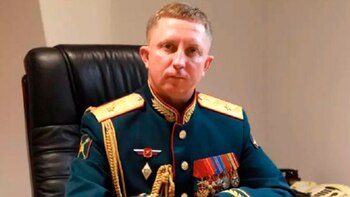
The Ukrainian Ministry of Defense reported another severe blow to Putin's troops: the death of Russian General Yakov Rezantsev. According to Ukrainian sources, the high command was killed in an attack near the southern city of Kherson.
Rezantsev was the commander of Russia's 49th combined army. And according to the data of the Zelensky government, this is the seventh general killed, and the second lieutenant general, the highest-ranking officer known.
So far, Putin only admitted the death of one general, Andrey Sukhovetsky, in a speech given shortly after the start of the war. Russia says 1,351 soldiers have died since the war began in Ukraine, although Kiev and Western officials say the figure is much higher.
As Jonathan Jackson, a specialist at Birmingham City University, explains, it is very likely that the attack on Russian high ground commanders is part of a broader Ukrainian strategy to disrupt the command and control network of its enemies. Ukrainian forces are aware of the leadership approach taken by the Russian armed forces since 2001. Its rigid hierarchical system, overseen by an autocratic leader like Vladimir Putin, condemns the lower ranks to a term of perpetual fear, with little room for independent thinking or decision-making.

It is true that the high commanders have always been exposed to becoming targets on the battlefield, something that the Red Army used to a devastating effect on the ruins of Stalingrad in 1942, where Soviet snipers targeted both the lower and higher ranks. However, what differs between this conflict and those fought in the past is the proximity to the front line on which Russian generals appear to operate. The lack of confidence they have in their lines of communication and at the level of ground commanders — a result of chronic levels of corruption — is providing clear opportunities for the Ukrainian military to beat up the few competent military leaders.
Ukraine has several well-equipped combat units that would be able to carry out specialized missions, so it seems that any opportunity could be taken to launch a direct attack on the generals, designed to disrupt the lines of communication, cause confusion and further slow down the Russian advance.
It is also hugely symbolic and provides a clear example to Russian bases that their enemies can easily target high commanders, demonstrating a failure of the system to protect their senior staff. It is a clear symbol of a weak and incompetent communication system that is forcing generals to move from strategic to tactical decision-making.
This causes distrust in the effectiveness of chains of command, and doubt spreads much faster than conviction.
The other generals killed:
Andrei Mordvichev was killed in an attack on Chornobaivka airbase near Kherson, according to Ukrainian officials. He was the commander of the Russian 8th combined army of the southern military district. His death was reported on March 18.
Major General Oleg Mityaev died somewhere near the city of Mariupol, a city in southeastern Ukraine that has witnessed some of the heaviest fighting yet. The nationalist Azov regiment claims to have struck him down.
Major General Andrei Kolesnikov, of the 29th combined army, was killed in the fighting on March 11, according to official Ukrainian sources.
Major General Vitaly Gerasimov, Chief of Staff of the 41st Russian combined army, fell on March 7 on the outskirts of the eastern city of Kharkov, according to the Ukrainian Ministry of Defense.
Major General Andrey Sukhovetsky, deputy commander of the same unit as Gerasimov, was killed by a sniper on March 3.
Colonel Yuri Medvechek, commander of the 37th Motorized Rifle Brigade, was run over by his soldiers, said a Western official quoted by Sky News journalist Deborah Haynes.
KEEP READING:
Últimas Noticias
Debanhi Escobar: they secured the motel where she was found lifeless in a cistern
Members of the Specialized Prosecutor's Office in Nuevo León secured the Nueva Castilla Motel as part of the investigations into the case

The oldest person in the world died at the age of 119
Kane Tanaka lived in Japan. She was born six months earlier than George Orwell, the same year that the Wright brothers first flew, and Marie Curie became the first woman to win a Nobel Prize

Macabre find in CDMX: they left a body bagged and tied in a taxi
The body was left in the back seats of the car. It was covered with black bags and tied with industrial tape
The eagles of America will face Manchester City in a duel of legends. Here are the details
The top Mexican football champion will play a match with Pep Guardiola's squad in the Lone Star Cup

Why is it good to bring dogs out to know the world when they are puppies
A so-called protection against the spread of diseases threatens the integral development of dogs




